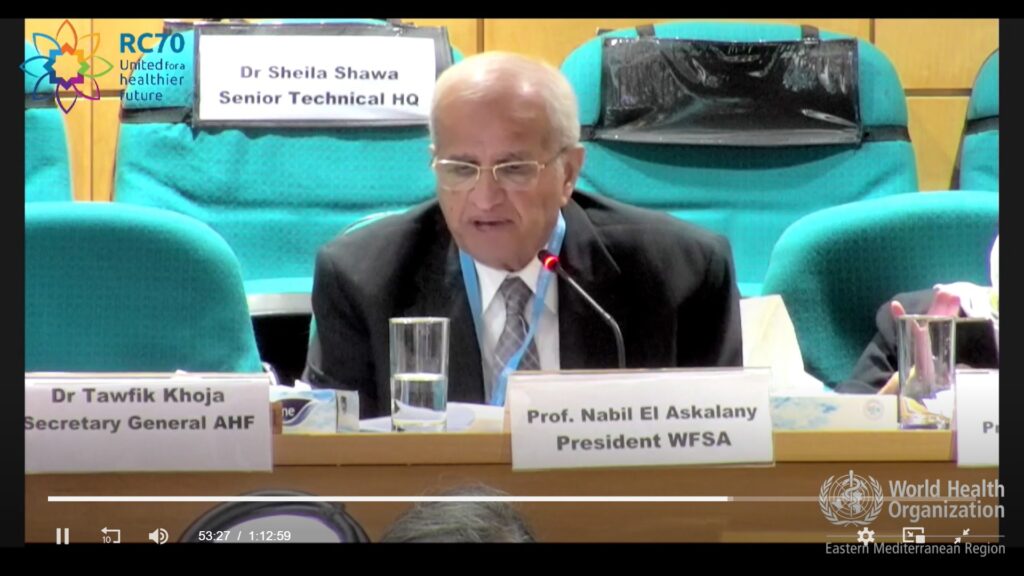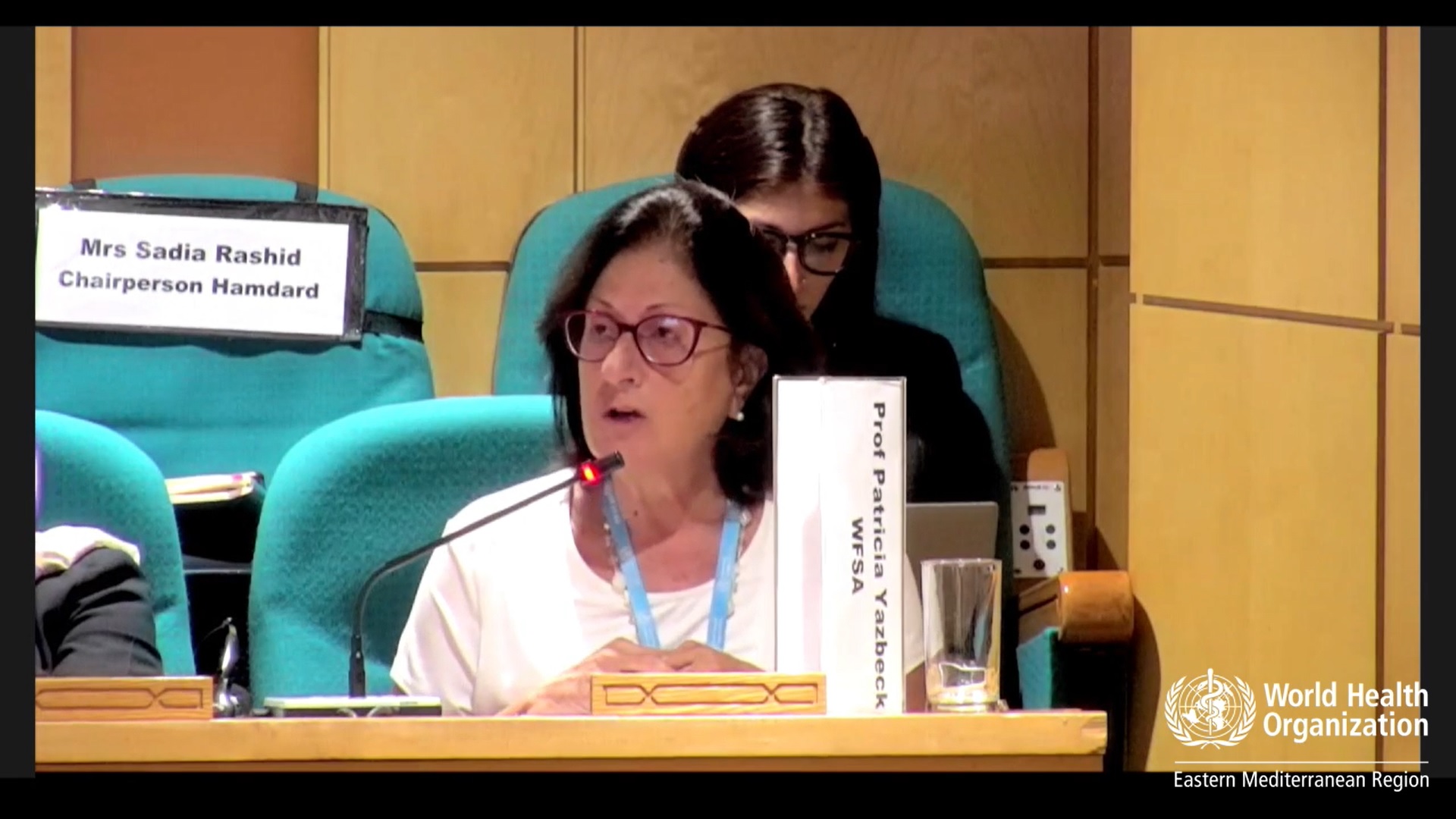WFSA urges EMRO member states to engage with WFSA Member Societies to – strengthen infection prevention and control approaches; integrate non-communicable disease care into emergency settings and strengthen the anaesthesia workforce.
WFSA representatives at the meeting were Profesor Patricia Yazbeck, WFSA Council member and a specialist in Anesthesia and Critical Care at St Joseph’s University, Beirut, Lebanon and Prof. Nabil El-Askalany, President of the Egyptian Society of Anaesthesiologists and Secretary of the Pan Arab Federation of Societies of Anaesthesia, Intensive Care and Pain Management (PAFSA).
Agenda item 3(a) – Addressing noncommunicable diseases in emergencies: a regional framework for action
The World Federation of Societies of Anaesthesiologists (WFSA) represents over 500,000 anaesthesiologists in over 130 countries, with 14 national member societies in the Eastern Mediterranean region.
The evidence from recent health emergencies, whether it be COVID, natural disasters or conflict, shows that it is often anaesthesiologists who play a key frontline leadership role in the immediate response to health emergencies.
This is emphasized by WHA Resolution 76.2 which identifies anaesthesia as a core component of the Emergency, Critical and Operative Care Services that are vital for a country looking to realize an effective primary health care approach.
Virtually all non-communicable diseases will require surgical intervention over the life course. Essential anaesthesia and surgical services are a vital, yet chronically under-resourced component of NCD policies and programmes. We will not be able to realise the ambitions of this resolution to address NCDs within emergency settings if we continue to neglect anaesthesia and surgery.
NCD health services are hindered by widespread shortages of medicines, workforce and diagnostics. This shortfall in the NCD workforce is keenly felt by anaesthesia professionals with many countries in the Eastern Mediterranean Region facing a chronic lack of trained anaesthesiologists.
The leadership and expertise of anaesthesiologists are vital resources that can be accessed by countries looking to prepare their health services to care for NCD patients during health emergencies and beyond.
WFSA calls on EMRO region member states and key stakeholders to:
1- Embed national surgical and anaesthesia plans into health emergency preparedness plans as well as wider national health plans and strategies.
2- Encourage Technical Advisory Groups on NCDs and health emergency preparedness working groups to seek expert advice from the region’s anaesthesiologists.
3- Address chronic NCD workforce deficiencies through investment in anaesthesia and critical care training and ongoing education.
Agenda item 3 (c) – Health workforce in the Eastern Mediterranean Region: from COVID-19 lessons to action

The World Federation of Societies of Anaesthesiologists (WFSA) represents over 500,000 anaesthesiologists in over 130 countries, with 14 national member societies in the Eastern Mediterranean region.
As our region’s response to COVID highlighted and the discussions about how to achieve Universal Health Coverage attest to, a trained and supported anaesthesia workforce is indispensable to a functioning and resilient health system.
As stated in the report the Eastern Mediterranean region continues to face a significant health workforce shortage. An area where this deficiency is most vividly evident is in the chronic lack of trained anaesthesiologists. The WFSA’s Global Anesthesia Workforce Survey found that the region had on average 3 physician anaesthesiologists per 100,00 far below the recommended interim target of 5 per 100,000 as outlined in the WHO-WFSA International Standards for a Safe Practice of Anesthesia.
As we saw during Covid, health systems that have historically under-invested in anaesthesia provision are placing more onus on these same services without the necessary increase in workforce investment. This increasingly pressurised workload is resulting in higher levels of professional burnout and damaging patient safety outcomes.
WFSA is delighted by the focus the technical paper and this discussion is bringing to a range of issues affecting the health workforce but to ensure anaesthesiologists can continue to provide a high level of patient care and safety we believe three areas require specific attention:
1. Capacity building – Invest in health workforce strengthening by focusing on continued medical education, and creating safe, equitable work environments with high-quality facilities
2. Resourcing – WFSA supports the development of National Surgical, Obstetric and Anaesthesia Plans (NSOAPs) to embed adequate resourcing into national health policy and planning.
3. Professional well-being – To limit clinician burnout, member states need to with clinicians and their professional bodies to prioritise well-being initiatives.
Agenda item 4(g) – Global strategy on infection prevention and control
The World Federation of Societies of Anaesthesiologists (WFSA) represents over 500,000 anaesthesiologists in over 130 countries, with 14 national member societies in the Eastern Mediterranean region.
With their expertise in resuscitation, ventilation, peri-operative and post-operative care, blood management, critical care, pain management and much more, anaesthesiologists are one of the few specialists to work at multiple points throughout the patient pathway. Anaesthesiologists therefore play a vital leadership role in ensuring patients receive the best protection against healthcare associated infections.
As noted in this discussion, many countries in our region do not have sufficiently strong infection prevention and control programmes. The region continues to lack an integrated approach to inter-related IPC and clinical management issues including surgical site infections, sepsis or anti-microbial resistance.
To reduce healthcare associated infections and improve patient outcomes across the region WFSA calls on EMRO member states to:
- Engage with anaesthesiologists in the development and implementation of integrated IPC initiatives.
- Address chronic IPC workforce deficiencies through investment in training and ongoing education.
- Adopt the recommendations of the WHO Model List of Essential Medicines and the WHO Antimicrobial stewardship programmes in health care.
- Intensify efforts to strengthen early detection, diagnosis and therapy of sepsis and ensure syngery with antimicrobial stewardship and IPC programmes.
- Work with professional bodies such as WFSA’s national members in conjunction with EMRO’s IPC Hub to strengthen the evidence base and develop IPC standards and toolkits which will make tangible impacts on the well-being of patients in the region.






